Key takeaways:
- Vegan cheese alternatives come from diverse ingredients like nuts, soy, and root vegetables, offering unique flavors and textures that can satisfy various tastes.
- Benefits of vegan cheese include lower cholesterol and saturated fat, increased digestibility for those with lactose intolerance, and a positive impact on the environment.
- Popular types of vegan cheese, such as cashew, almond, and coconut-based cheeses, can enhance dishes and surprise non-vegan eaters with their delightful flavors.
- Creative pairing of vegan cheese with fruits and savory ingredients elevates the dining experience, making brunch gatherings enjoyable and memorable.
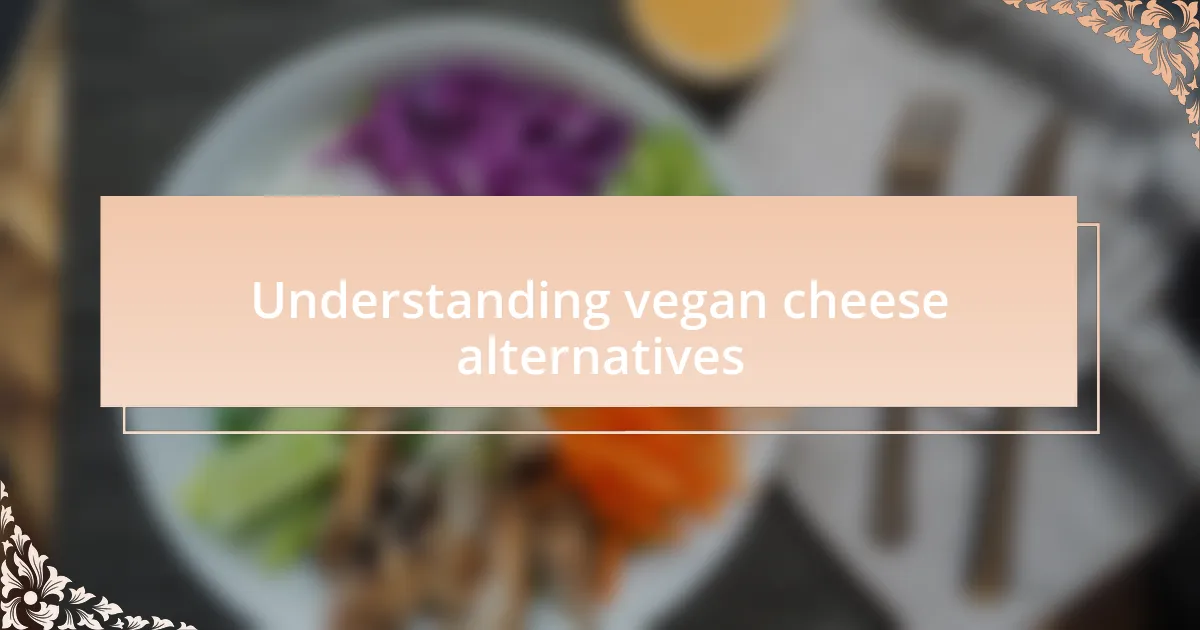
Understanding vegan cheese alternatives
When I first explored vegan cheese alternatives, I was surprised by the variety available. It’s not just about replicating the taste of dairy cheese; these alternatives come from a range of exciting ingredients like nuts, soy, and even root vegetables. Isn’t it fascinating how something that can be so simple as cashews, when blended and fermented, can create a creamy cheese-like texture?
I remember the first time I tried vegan mozzarella on a pizza. The gooey stretch was nothing short of magical, and it sparked curiosity about how these products were made. The process often involves fermentation and careful seasoning, which adds deep flavors and that satisfying mouthfeel we associate with traditional cheese. Who would have thought that a mix of cashews and nutritional yeast could bring such joy?
As I continued my journey, I found that each vegan cheese alternative has its own personality. Some are tangy, while others are rich and nutty. I often ponder, what’s my favorite? It truly depends on the dish and my mood. Each alternative offers a unique experience, opening up a world where flavor and nutrition can coexist in wonderful harmony.
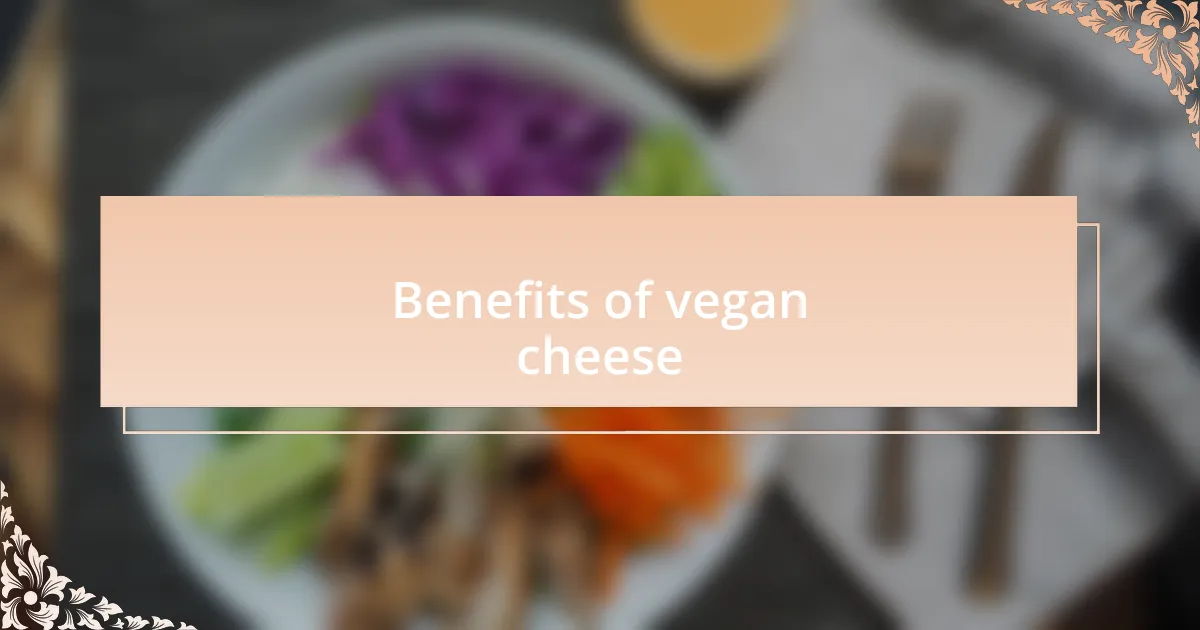
Benefits of vegan cheese
Vegan cheese offers a fantastic way to enjoy cheese-like flavors without the cholesterol and saturated fats found in dairy. I recall a brunch gathering where I served a spread of vegan cheeses alongside fresh fruits and crackers. The guests relished the flavors, and it was a delight to see how they appreciated the lighter, healthier options without sacrificing taste.
Another significant benefit is the increased digestibility of vegan cheese. For those with lactose intolerance like myself, traditional cheeses can sometimes lead to discomfort. I’ve found that swapping in nut-based cheeses not only satisfies my cravings but also leaves my stomach feeling content and unburdened. Have you ever experienced the relief of enjoying a cheesy dish without any of the side effects?
Moreover, incorporating vegan cheese alternatives can align with a sustainable lifestyle, reducing environmental impact associated with dairy farming. I often think about how our food choices ripple through the planet. Choosing these alternatives feels like a small but meaningful step towards supporting sustainable agriculture. How can you say no to food that is both delicious and better for the Earth?
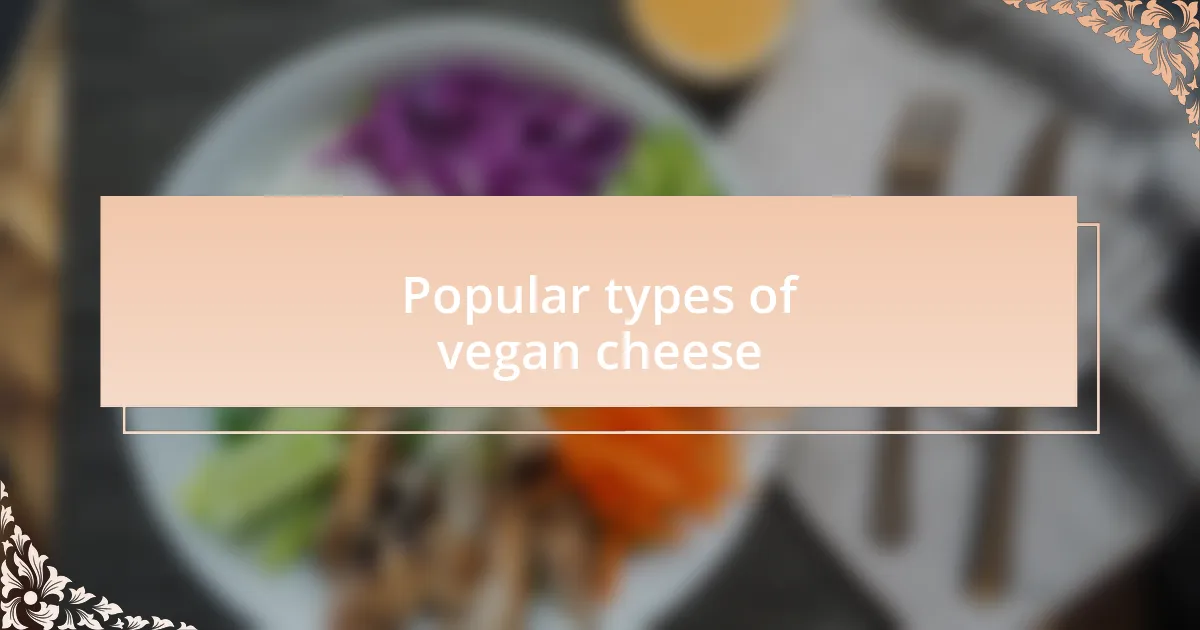
Popular types of vegan cheese
There are several popular types of vegan cheese, each with its unique flavor and texture that can elevate any dish. For instance, cashew cheese is a favorite of mine, renowned for its creamy consistency and rich taste. I remember making a cashew cheese spread for a simple brunch at home, blending soaked cashews with nutritional yeast, garlic, and herbs. The result was a delightful spread that had my friends asking for the recipe!
Another widely adored type is almond cheese. It offers a slightly firmer texture, making it perfect for slicing and presenting on cheese boards. I once brought an almond cheese wheel to a potluck, and it was gone within minutes. People were surprised to learn it was completely dairy-free, which sparked an animated discussion about our favorite plant-based options. Have you ever had that moment when you realize something delicious is also good for you?
Lastly, we can’t ignore the ever-popular coconut-based cheese. Its mildly sweet profile can add a unique twist to recipes, especially in desserts. I’ve used coconut cheese in vegan cheesecakes and was amazed at how well it mimicked the creamy decadence of traditional cheesecakes. It’s fascinating to discover how versatile plant-based cheese can be, pushing the boundaries of what we traditionally consider when thinking about cheese dishes.
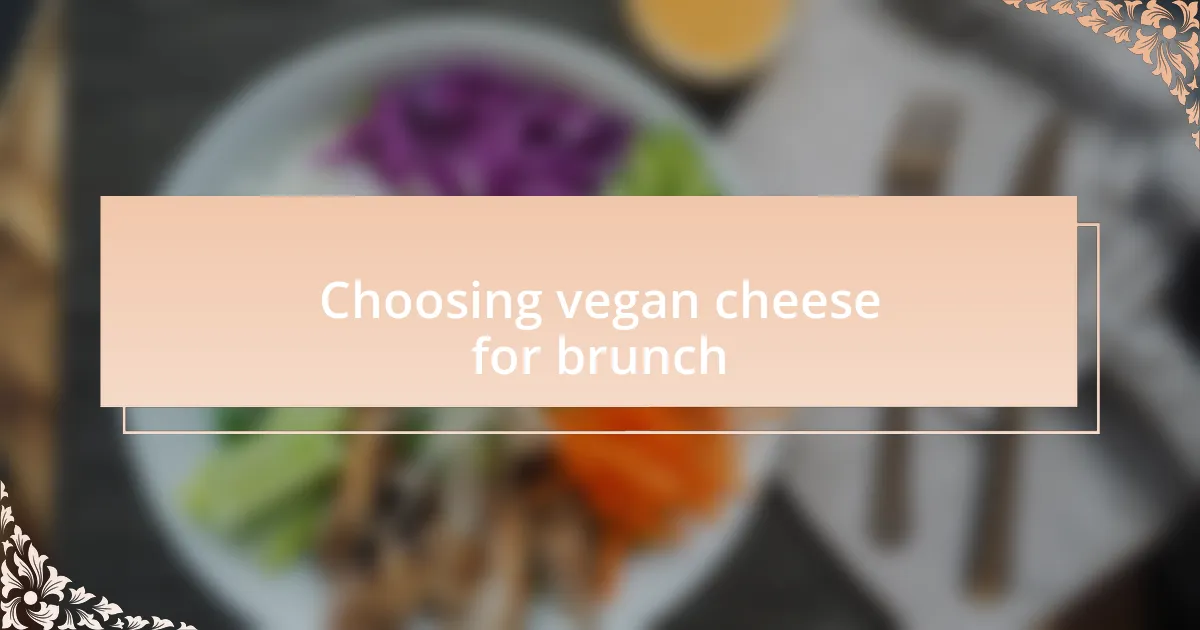
Choosing vegan cheese for brunch
Choosing vegan cheese for brunch can be quite the delightful challenge, filled with exciting options that cater to different taste preferences. I remember one brunch where I experimented with a creamy, herbed cashew cheese; it was such a hit that guests couldn’t believe it wasn’t dairy! Have you ever seen everyone at the table rave about a cheese spread that’s not actually cheese? It just goes to show how delicious vegan alternatives can be.
When planning a brunch, I often consider the textures and flavors that will pair well with my menu. For example, a smoky almond cheese can add depth to a savory breakfast platter, while a tangy coconut-based cheese can brighten up a fruit salad. I have this vivid memory of a sunny brunch where I paired my favorite vegan cheese with fresh berries. It was a surprising combination that made everyone smile!
Don’t overlook how presentation plays a role in the experience. A colorful cheese board adorned with various types of vegan cheeses, fresh herbs, and vibrant fruits makes for an inviting centerpiece. It’s truly rewarding to witness guests stepping out of their comfort zones, trying different cheeses and discovering new favorites. Isn’t it amazing how food can open up avenues for conversations and connections?
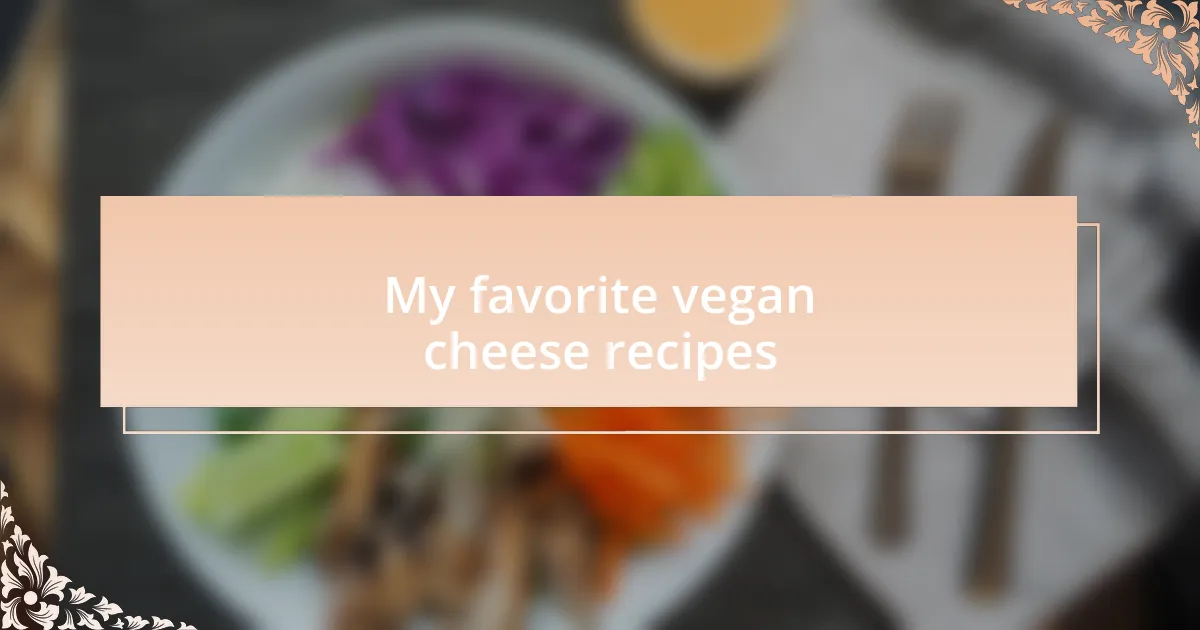
My favorite vegan cheese recipes
One of my absolute favorites is the cashew-based chevre, which I blend with fresh herbs, lemon juice, and a hint of garlic. When I first tried this recipe, I felt like a gourmet chef—even though it was so simple! Spreading it on toasted sourdough, I was surprised at how much it reminded me of the tangy goat cheese I used to enjoy. Isn’t it wonderful how a few ingredients can transform into something so indulgent?
Another standout is my version of vegan mozzarella made from soaked cashews and nutritional yeast. This cheese melts beautifully on pizzas and even adds a delicious creaminess to lasagna. I remember serving it at a family dinner, and everyone kept asking for seconds, not realizing it was dairy-free. How rewarding is it to watch loved ones relish a dish bursting with flavor and texture, all while being cruelty-free?
I also adore making a simple yet flavorful vegan feta. By tossing crumbled tofu with olive oil, lemon juice, and a sprinkle of oregano, I create a quick substitute that brightens up salads. The first time I served it at brunch, the vibrant colors and refreshing taste captivated my friends. Can you imagine how satisfying it is to know you can create something so delicious and accessible?
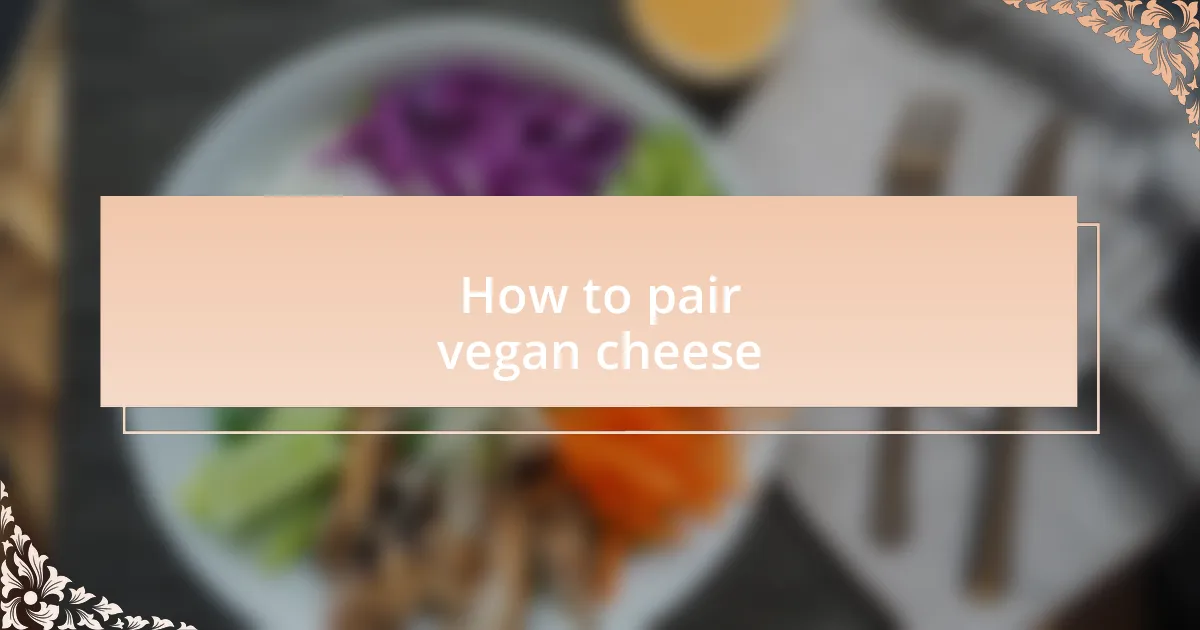
How to pair vegan cheese
When it comes to pairing vegan cheese, I’ve discovered that contrasting flavors can elevate the experience. For example, I love serving my herbed cashew cheese with sweet fruits like figs or stone fruits. The creamy, tangy notes balance beautifully against the natural sweetness, creating an irresistible appetizer. Have you tried it with a drizzle of balsamic reduction? It’s a game-changer!
I also enjoyed experimenting with my homemade vegan mozzarella on various dishes. One memorable brunch, I layered it with roasted tomatoes and fresh basil on a ciabatta roll. The combination made for a delightful and refreshing sandwich that both vegans and non-vegans couldn’t resist. It’s amazing how the familiar flavors of a classic caprese can transport you back to those sunny picnics in the park, don’t you think?
For a savory twist, I often pair crumbled vegan feta with earthy flavors like olives or marinated artichokes. This zig-zag of flavors creates a symphony on the plate. I vividly recall a gathering where this combination sparked conversations about food and culture, turning a simple salad into a shared experience that fans of Mediterranean cuisine deeply appreciated. Isn’t it inspiring how food can connect us?